Ahoy, squirts! Quint here. So, it’s finally time to run this super spoilery interview with Cabin in the Wood’s director, Mr. Drew Goddard.
And I do mean spoilery. We go into great discussion about the mythology of Cabin in the Woods, talk about the challenges of the last act of the movie, some of the nuances of the… flavor… of this unique and ambitious idea stewed up by Joss Whedon and Goddard… I’ll be vague here just in case someone didn’t notice the giant red SPOILER box around the headline, but be warned… we don’t gently dip our toes into this material in the interview… we jump right the hell into the deep end.
Once we’re past the first picture (also a spoiler) I don’t want to hear any bitching about being spoiled. I held this interview for a reason, to give you ample time to see the flick.
Odds are that you’ve enjoyed the film as much as I did or else why would you be reading this? I hope you find this chat with Mr. Goddard enjoyable and, dare I say, enlightening… at least a little bit.
So, one more, final, warning… Don’t read this if you haven’t seen the movie! Scroll down if you have and/or just don’t shive a git. Enjoy!
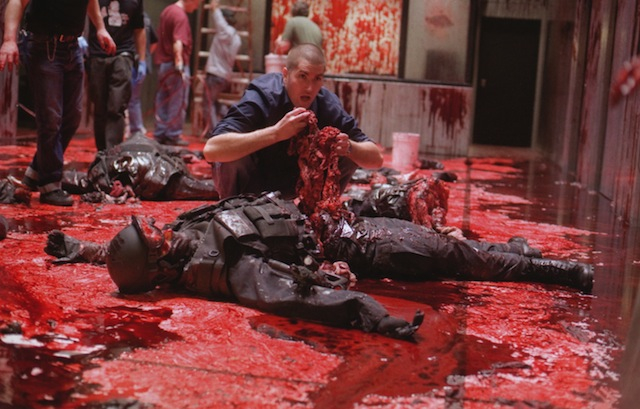
Quint: I loved your film.
Drew Goddard: Thank you! This works out well. (Laughs)
Quint: When I saw it at Butt-Numb-A-Thon...
Drew Goddard: Oh, I wish I could have been there. I really do.
Quint: Everybody on the site is so on Team Whedon and I’m a little bit more on the outskirts. I liked FIREFLY a lot, but I never really got hooked on Buffy… I bring this up only to explain that I wasn’t the easy sell on this movie and it kicked my ass. Not that I actively disliked the work that you guys have done, but...
Drew Goddard: No, I get it.
Quint: When the title card came up, I’m like “Okay, I’m on board.”
Drew Goddard: (Laughs) That’s good to hear. There’s a lot of debate as to whether or not people would get that title card. It was nice.
Quint: I grew up with horror, so I loved seeing a loving deconstruction. There’s only really a few authentic smart looks at the genre that deconstruct it, but in a very loving way and it’s not coming from a “Hey guys, isn’t it silly that all of the virgins live and all the sluts die?” and “If you get stoned, you’re going to die.” I think a lot of people saw SCREAM and a lot of filmmakers were like “Oh, I get it. I just have to say ‘This is stupid’” and that’s not what Scream was.
Drew Goddard: That’s right, they took the wrong lessons from SCREAM.
Quint: Honestly, that’s what kind of hooked me into the world of Cabin in the Woods. I could honestly feel the passion that you guys have for genre and so I guess we should maybe start with just talking about that passion and just how you guys walked that balance of wanting to play with the genre, but not put yourself above the archetypes.
Drew Goddard: You know I think it was pretty easy, because we didn’t set out to deconstruct the genre. We didn’t set out to subvert. We knew that that would happen, but that wasn’t the goal. The goal was just to write a movie that we loved, because we love the genre. It really came about with Joss and I looking at each other and saying, “Let’s write something together. If we could write anything and not worry if a studio is going to make it, let’s just write for the sake of writing. What would we want to do?”
And we latched onto the horror genre very quickly, because we hadn’t done sort of balls out horror together. Certainly with some BUFFY episodes we did a little bit, but we really wanted to go for it. That approach was very organic in the sense that we just said, “Okay, if we are doing a horror movie, what do we want to do? Let’s just put everything we want to do in it and see what happens.” It was never like this goal of deconstructing or subverting.
Quint: So it was more of a “kitchen sink” approach where you are just like “I love so much about the genre, why don’t we see how much of it we can fit into one story?”
Drew Goddard: Yeah, a little bit. That was certainly how we began and then once you do that you start shaping it and then the themes start to come out and you start to say, “Oh, this is interesting. Let’s think about this.” But it was never like… I think what you’re talking about, in terms of people taking the wrong lessons from SCREAM, I think the thing I love about SCREAM is it was obvious they loved horror movies and I don’t get the sense that some of the people that tried to be like that did, you know?
Quint: No, they just tried to copy the success.
Drew Goddard: Yeah and I feel like that was what we did. We just set out to make a movie we wanted to watch.
Quint: We have to talk about the basement. That’s a thing… for the next 15 years you could go back every year and do a movie where they pick a different item. You realize this, right?
Drew Goddard: (Laugh) Yes.
Quint: And every time there would be a different outcome. The set dec was incredible.
Drew Goddard: Incredible.
Quint: I didn’t even notice… That was my second time watching the movie last night and I didn’t even notice the unicorn tapestry that you mentioned during the Q&A.
Drew Goddard: It’s down there! There’s a lot down there that requires some freeze-framing.
Quint: What’s your favorite object and the monster that’s associated with it that might not be as obvious?
Drew Goddard: Well, my favorite object for sure is our sort of Rubix Cube ball. That was a little more obvious, but I love it. The prop design is just spectacular.
Quint: And what’s great about is even though it’s not the HELLRAISER cube, anybody who watched a horror movie in the eighties looks at it and when he starts clicking it together, you’re like “I know what that represents…”
Drew Goddard: Right, it certainly conjure that up and that was one of the times we got the most sort of specific, because I felt like in HELLRAISER they really did create a modern myth, you know?
Quint: Clive Barker is really good with that. CANDYMAN still scares the shit out of me.
Drew Goddard: Yeah. I mean he really is good at creating those icons and so much of this movie is about icons. It wasn’t about shout outs, it was about “Let’s honor the myths” and I feel like in the last 20 years there have been some that are worthy of the pedestals alongside werewolves and vampires, I feel like there are some that deserve to be up there and that’s certainly one of them.
Quint: So for people who watch the movie the weekend that it comes out, are there things that you might want to tell them to look out for? Either in the basement or something to go back when they go back and take their friends? Is there anything specific that you might want to highlight?
Drew Goddard: Not really. I designed this movie… frankly just because I have to watch this movie thousands of times, I designed it to get better the more you watch it, so we definitely packed a lot in there for repeat viewings so that it sort of reveals itself as you keep watching and I don’t want to ruin that for other people. Just know we put a lot in there. There’s a lot on there. (Laughs)
Quint: So, you have the elevator scene.
Drew Goddard: Right.
Quint: And the shit gets real.
Drew Goddard: Shit definitely gets real! (laughs)
Quint: This was kind of touched on in the Q&A last night and I’m trying to reword it, because I don’t think they quite asked what I’m trying to ask. I think they asked like “Oh, what monsters didn’t make the cut?” Obviously pretty much everything that horror has spewed out is in the movie in some form, but is there something that you wanted to feature more that was kind of more relegated to the background?
Drew Goddard: Not really. The truth is I got to do everything I wanted. That’s the nice part about being the director is you sort of get to do it and when you want something they make it happen. Even budget, you know? We didn’t have a very high budget, so some of the stuff I wasn’t sure we could afford… we would always find creative ways to do it. We would always just find a different way of doing it and I find with horror, and Joss and I talk about this a lot, it’s hard to find a lot of really good big budget horror films. There’s something about the rough edges and the creative use of things that just makes horror films better. That’s why we didn’t want to do a big budget version of this movie. We wanted to feel those rough edges and when it came to our creature design we would just do the best version we could and found that worked out much better than if we had spent the money to make the perfect digital version of it, you know? It just worked better.
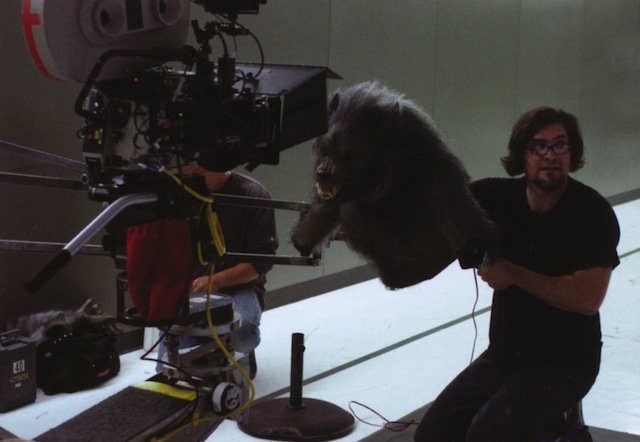
Quint: What I love about that sequence is much is that it puts you in the mentality of the guys running the “office,” where you’re like “Shit, if I were working there I would be in the betting pool, too. I want to see the merman!”
Drew Goddard: Right.
Quint: I just loved seeing that stuff and the flavor of the universe, by showing glimpses of what could have been had one of the characters picked up a different item. It just expands the universe so much bigger than I was expecting it to.
Drew Goddard: That’s nice to hear, certainly.
Quint: The third act is almost a different movie, but it doesn’t feel like two jarring films mashed together. How difficult was it to balance the tone of both sections of the film?
Drew Goddard: It’s the hardest part of the job, maintaining tone on this movie, because we shift gears so much, often in the same scene. That was definitely the biggest challenge, but the thing that’s easy about is is that there’s no manual for tone. Tone is just subjective. It’s just what I like. That’s all that it can come down to. There’s no right or wrong with tone, it’s just “This is what I like,” so I just had to police it. It kind of just had to come down to my gut. It’s a really hard thing to communicate. People are like “Well why is that joke okay, but this one is too broad? That joke is pretty broad.” And I would say, “I don’t know, but it feels right to me that we are doing it here and not here.”
Quint: Apparently you freaked out somebody in the audience last night by shooting Anna Hutchison very sexily, but to me it’s all done with a reason. It’s all playing with established archetypes and it’s always done with a twist. There is kind of an explanation for why she’s suddenly the sexy dumb blonde after she dyes her hair.
Drew Goddard: She’s pre-med! It’s definitely in there.
Quint: Yeah, but I love that the jock was smart and I love that the dweeb was also heroic. That’s something that you and Joss do very well, you take established things and just spin them just a little bit.
Drew Goddard: Yeah, that was the goal.
Quint: So are you going to talk to Guillermo del Toro about coming in and doing the sequel?
Drew Goddard: How great would that be? We had talked with Guillermo a lot. I love that man and I’m excited for him to see this, I hope he knows that.
Quint: That’s all I kept thinking about when the mythology of the movie that you set up. I was just like “Oh man… Somewhere Guillermo’s got a giant smile on his face.”
Drew Goddard: (laughs) That would be fun.
Quint: We should talk a little bit about the mythology. At what point did that solidify for you? There must have been a point where it became more than just “Oh, this is all an experiment,” when you actually figured out there was a really fascinating mythology around the need to tell scary stories.
Drew Goddard: Right.
Quint: And for horror viewers especially I think that’s crucial, because I think if you hadn’t done it that way it, if it had been more of an experiment, it would have been more of a fuck you to horror fans for even liking the movie. The way you set up this mythology, though, the office guys, in their own way, are the heroes of the story.
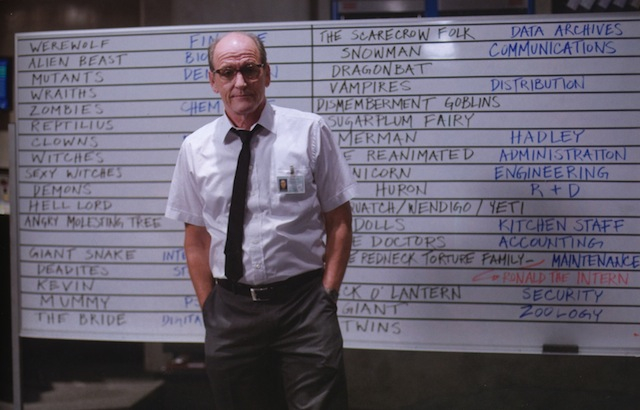
Drew Goddard: That’s right. Someone else was asking me about the villains and I was like “I don’t think there are villains in this movie.” I mean everyone has their point of view and both points of view are right, it’s just “Which one do you come down on?” I’ve come down on both sides at various points in my life, you know?
It was important to us that the questions of CABIN started with that basic question of “What is it about watching kids get slaughtered on screen that people like? Where does that come from?” Then you take that a little further and you start to think “Why do we feel this need to idealize and then marginalize and then destroy youth? Why does that happen in our culture?” It’s not just in horror movies, it just sort of happens where you build these kids up and then you rip them down and we are doing that constantly. You can extrapolate that to there’s a reason we are sending our kids off to fight our wars and we are not doing it. They are our fodder.
The more you explore those questions the more it built our mythology, because you start to realize this is not limited to just recent horror movies or horror movies in general or cinema in general, this is something we’ve been doing forever and that just suggested a much bigger mythology to us and just suggested a picture that wasn’t limited to any one thing. It was more about who we are as people and the mythology sort of built from there.
Quint: The casting on the is movie is so spot on in every aspect, from the kids to the Crazy Ralph character (Mordecai, played by Tim De Zarn), but I can’t imagine what this movie would be without Bradley [Whitford] and Richard [Jenkins].
Drew Goddard: I actually yelled in a meeting early on, “If I can’t have Bradley Whitford, I don’t want to make this movie!” (Laughs) Because I just couldn’t imagine anyone else and thank God he said “yes” or we might not have made the movie! (laughs)
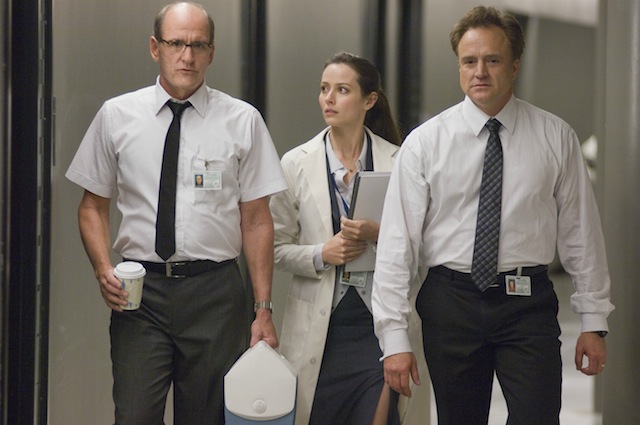
Quint: And they work so well off of each other. They hit that amazing balance of guys that have worked together for a decade or more, they know each other in and out. They are professional, but they’re also kind of coasting a little bit. I think with the office guys especially, if you mess that part up then the movie just becomes “Oh cool, I recognize that monster.”
Drew Goddard: It’s crucial. Yeah, they needed to bring that. That’s the thing I love about both of them, they can really make you laugh, but then also break your heart, so you really just believe this passion and sadness that’s within them that’s at the heart of this. These are men that have come to terms with the fact that they have to do a hard job, but they are still decent people, they just have a very difficult job to do.
Quint: And they have to some times use brevity to make it bearable. Just like soldiers on the battlefield, there’s a gallows humor to their line of work. If you are worried every day about the fate of the world, you have to use humor to alleviate it.
Drew Goddard: Absolutely.
Quint: Let’s talk about the kids. You got Chris Hemsworth before he blew up, but the entire cast is just very charismatic and I loved how the stoner played to the audience last night. You could tell whose side they were on.
Drew Goddard: Yes, that’s right. (laughs) It was a very pot friendly crowd last night.
Quint: But they work together as a unit and it’s a trickier chemistry than it appears on the surface because they have to work as friends before the influence of the cabin and the whole set-up, but also work together as the more stereotypical horror bunch of friends they turn into along the way. So, how difficult was it to find the right people? Did you have to put them all together before you knew that it worked or did you cast them individually?
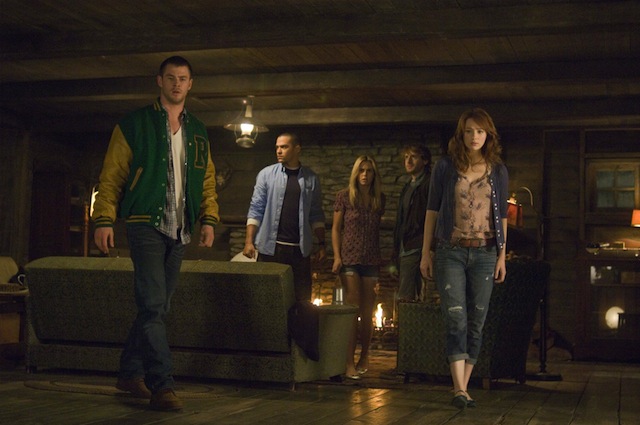
Drew Goddard: Yeah, we mixed and matched a little bit just to see. It was tricky. This movie is interesting because we ask a lot of our actors; we ask them to play two roles essentially. We asked them to play a character and an archetype and there’s an internal conflict that is happening in each of them where sometimes the archetype is coming out and sometime the character is coming out and as the influence that you’re talking about goes down then the character gets to come back out and we have moments where you’re like “Oh, that’s the guy that we met in the beginning. He’s back.” And that’s hard. That’s hard to do and the actors that we chose, all of them, when they came into the audition they just played the character. I always said “Look, I can make you into an archetype.” That’s easy. But to find this character and let that happen… all of them just sort of got it.
When we started putting them together… The thing I didn’t tell them, but I realized it was so important, is that in these movies one thing I don’t like is when the kids don’t care about each other. I was like “If you guys don’t care about each other, then I don’t care about you.” They really are looking after each other. They really are caring about one another and that was crucial. I don’t think I told them to do that, it just sort of happened organically and that’s how we knew we were on to something.
Quint: You have an implied history with everybody, even the stoner and the hot chick had a little fling, but at such a young age where it wouldn’t conflict with the friendship. It’s all really smart. Some times you can have a movie that’s really smart, but isn’t fun and this is movie the reason why I think people are flipping out about it is that not only is it smart, but it’s a movie where you want to grab your friends and take them to go see it.
Drew Goddard: It was our goal.
Quint: Listen, there’s fun and there’s stupid and there’s a very fine line between the two.
Drew Goddard: That’s right. (Laughs) Was it Nigel Tufnel that said that? Yeah, no and you know I just said, “Look, first and foremost let’s have fun,” because I don’t want to go fucking watch a term paper! That wasn’t the goal. That’s the fun part about working with Joss, we never tell a story just for the sake of telling it, there’s always something more interesting at play and he is just unafraid to say “Okay, but now that we know what the core is, let’s have fun” and that’s the secret. I mean really just finding a strong core to the story and then once that’s happening, don’t worry about it. We don’t have to beat everyone over the head, just have a good time.
Quint: Was this SXSW screening your first time seeing it with a large crowd?
Drew Goddard: It was, yeah. It was the first time seeing the finished movie with an audience at all.
Quint: Were there any moments that you were really psyched that people responded to?
Drew Goddard: Yeah. It was fun to see… There was a lot. I mean there was a lot in the movie that I was surprised at the laughter it elicited, like there were laughs that I thought “I’m not sure the audience is going to get this.” There were things certainly where the studio was worried (about) and what was great about the SXSW crowd, so many times they were ahead of the movie like just ahead enough that they could see something bad was about to happen to somebody and they could anticipate where that was coming and you could just feel them start to light up and it was really fun to feel that rip through the crowd, you know?
Quint: I think I know specifically which one you’re talking about.
Drew Goddard: There are two of them actually. There was one that involved the death of a character and one that involved elevators and they were just like “Oh, this is good.” You could feel the sort of people starting to figure this out and that was definitely fun.
Quint: How many times are you going to get to see the movie with a crowd? Is that a nerve wracking experience for you or are you at this point where you’re just excited to hear how it plays?
Drew Goddard: I’m at the point where I’m just excited. That’s actually one of the benefits of the movie being delayed a little bit. As a filmmaker it’s hard to watch the movie at first, because you’re just seeing “Oh, I wish I would have gotten that shot instead, I wish I had done this… Oh, that’s the day we didn’t have enough time.” Any time I’ve ever worked on anything as a director or writer, that’s just what happens when you watch a first cut and then after time you start to see it for what it is and then you start to appreciate it.
Now that a little time has gone by I forgot all of those things that I wish I had done and can just appreciate it for what it is and so it’s nice. It’s fun and audiences are having fun, so it’s nice to hear people laughing and clapping where you want, so I really enjoy it.
Quint: How happy are you that it’s not in 3D?
Drew Goddard: Oh, so happy. So happy. I mean I don’t know that I ever really believed it ever would be, but I knew that we had to go through that dog and pony show. The truth is I don’t even know if we could have made this movie in 3D. I shot this movie so dark. I like a dark frame for horror movies and dark frames just don’t convert. So if they actually had tried to convert this thing… Let’s say they made me, because Joss and I were like “No, we don’t want to,” but we agreed to explore it, because the studio asked us to and at the time it was very much a flavor of the month and we said, “Sure, we will look into it.” Then we did a couple of tests and it was just like I didn’t frame it for 3D, conversions don’t work, they don’t look as good and it’s so dark, it just would have been terrible.
Quint: It would have taken away from the movie. It wouldn’t have added anything.
Drew Goddard: It definitely would have. I mean I’m not against 3D. I like 3D, it’s just you want to plan for 3D. I did not plan for 3D on this movie.
Quint: In the digital effects world it’s what happened with THE THING prequel/remake. It’s like they shot with practical effects and they didn’t plan for as much CG, so that’s why the CG looks so horrible. Or you can be DISTRICT 9, plan for CG and they made some of the most amazing CG ever.
Drew Goddard: Yeah.
Quint: So what’s in the future? You have CABIN hitting in April. Where are you going from there? More features? Is that where you’re wanting to go?
Drew Goddard: Yeah, I mean the nice thing about my career is I’m at the point where I get to just go do what’s fun. (Laughs) Say I wake up in the morning and I want to work on a TV, I work on a TV show. If I wake up and want to write a movie or a comic book… It’s just nice. It’s sort of a dream and right now I’m just enjoying CABIN. It’s been a while and it’s just fun to see it, then we’ll see what happens next.
Quint: And it’s good that Lionsgate seems to be really behind it too, because there are a lot of really good movies that get shelved and then that becomes their identity. I mean shit, RED DAWN is still not out.
Drew Goddard: That’s right. Lionsgate really just got what we were trying to do and got on board and it’s been wonderful, you know?
Quint: It’s good to show that films don’t always have a shelf date. If it’s good and you screen it and people want to see it, it’s just like any other movie.
Drew Goddard: That’s right. Well the nice thing too is there’s something different about being shelved and just being at a studio that went bankrupt. I mean the same thing happened to THE HOBBIT and JAMES BOND, we all went down. No one’s saying “Why is THE HOBBIT sitting on the shelf?” even though it’s the same scenario. You don’t really worry about that, it’s worked out for us.
Quint: Right. The Hobbit wasn’t shot before the bankruptcy, but...
Drew Goddard: Right, but “Why hasn’t anyone got that going? Obviously everyone in the world would greenlight THE HOBBIT.”
Quint: Well, I’m excited to see whatever you guys come up with. I’m a big fan of what you guys did with CABIN. And I love seeing movies that look like movies again. It’s one of the reasons why I’m happy it wasn’t 3D because that would have detracted from its filmic look.
Drew Goddard: I know. I like film and I didn’t realize this at the time, but this might be the last time I get a chance to shoot on it. I’m so glad I did, because it’s a movie about movies as much as anything and I wanted to feel film. I want you to feel the rough edges. I want you to feel the grain, you know?
Quint: You have to if you are making a slasher film.
Drew Goddard: You want that.
Quint: The basic clarity of digital doesn’t jibe with what this sort of film is supposed to feel like… For me, at least. Now for the next generation that will be what it is, but I grew up on horror flicks having a little bit of texture to them.
Drew Goddard: That’s right. It gives you this sort of veil in between audience and character that instantly puts you on edge a little bit.
Quint: There’s just something about film. It’s what movies are to me. I guess at some point I’m going to have to get over it and stop screaming at the kids to “get off my lawn.”
Drew Goddard: I know. I feel the same way, because we’ve lost this battle. It was shocking to me going through this process and just seeing how different things are than when we shot this film, but so few theaters are even projecting film anymore and once that happens, then it is like there’s no point. It’s sad, but I’m glad I got to do it.
Quint: Yeah, I’m glad you got to do it, too. Thank you very much for your time. I appreciate it.
Drew Goddard: It’s such a pleasure. I love the site so much. I love your work, so please keep up the good work.
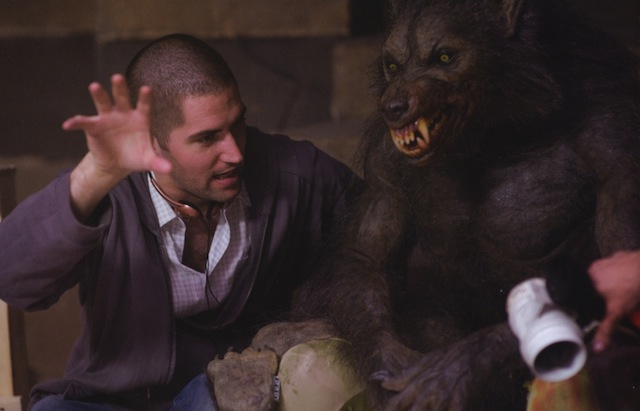
There you have it. I’m a big fan of these lengthy interviews intended for post-release publication. It feels like a real conversation instead of one that’s darting around spoilers. I’d love to make this a regular thing with higher profile geeky flicks. I’m sure Christopher Nolan would be up for that, right? Heh.
Hope you guys enjoyed the chat and if you dug the flick drag your asshole friends who didn’t go last weekend to the theater. We don’t get good horror flicks like this too often, so support ‘em when they show up!
-Eric Vespe
”Quint”
quint@aintitcool.com
Follow Me On Twitter

